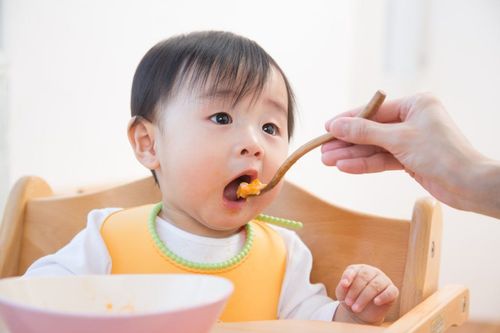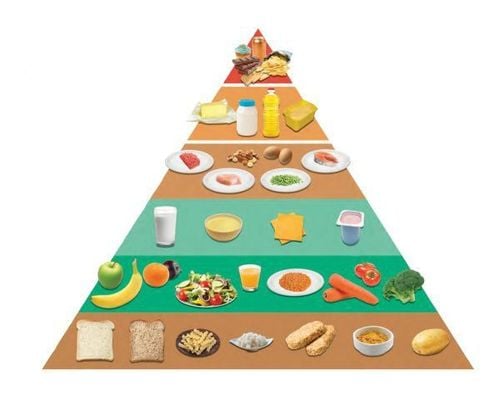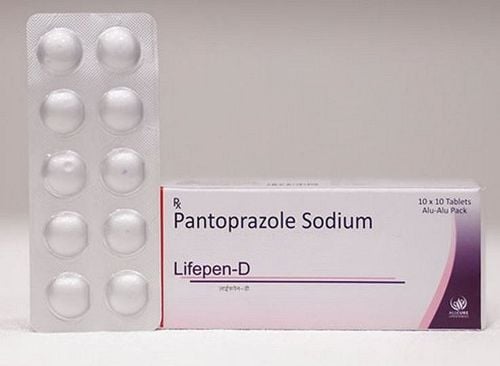This is an automatically translated article.
Digestive disorders are a very common condition in children starting to eat solid foods, this situation not only confuses many parents but also affects children's health in the long run. Recognizing the signs and how to treat each problem will help early digestive disorders in children improve.1. Baby has gastroesophageal reflux when eating solids?
Gastroesophageal reflux is an involuntary movement of stomach contents into the esophagus. When babies learn to eat solid foods, changes in food texture can cause GERD to recur from infancy or become more severe.
The following changes can help parents better manage this baby's digestive disorder when weaning:
Hold the baby in an upright position in your arms for 30 minutes after each and every feeding mile. It is always best to keep the baby upright by only introducing solids when the baby can sit up. Feed less quantity and feed more often. Make sure your baby has burped after each meal before laying them down. Don't tie your baby's diaper too tight. Reflux usually improves as the baby gets older, especially as the baby learns to sit firmly and practice self-directed weaning. However, do not hesitate to see your pediatrician if you notice the following symptoms.
Vomiting especially if green or reddish Anorexia or fussiness with feeding Weight loss or not gaining weight Rattle sound in the baby's chest and back Difficulty breathing when feeding Baby choking signs choking when baby tries to swallow food

Nếu bé bị trào ngược dạ dày khi ăn dặm, bạn nên giảm khẩu phần ăn của bé
2. What to do when the baby vomits?
Vomiting is defined as the forceful expulsion of gastric contents through the mouth or nose. At the age of weaning, vomiting can become an obsessive digestive disorder in children for mothers if they feed their children too quickly, eat too much or swallow air while eating. At this point, vomiting several times can be accepted as a sign of a common digestive disorder in children. However, persistent vomiting when switching to a solid diet can be a symptom of a medical condition. At this point, parents need to contact their pediatrician soon to diagnose the cause.Taking the following precautions can help your child avoid vomiting when eating solid foods, which can sometimes become a limiting factor that frightens and uncooperative children when learning to eat solid foods:
Always give your baby food. eat while seated to eat Continue holding baby upright after feeding Give your baby enough breast milk or formula to help prevent dehydration and nutrient loss. Keep your child cool and comfortable so that excess fluid is not lost through perspiration. Because vomiting a lot or continuously can cause dehydration, electrolyte disturbances in children, in the long run, make children malnourished, so parents should take their children to see a doctor immediately if there is a disorder. Digestive disorders in children occur in the following cases:
Vomiting very often Vomiting green bile Vomiting blood Vomiting followed by lethargy, lethargy, inflexibility Signs of pain and irritability after vomit
3. What to do when the baby has diarrhea?
When the baby reaches the age of solids, the frequency of bowel movements decreases and the stools will be thicker than when exclusively breastfed. Accordingly, diarrhea is also a digestive disorder in children when weaning. At this point, the passage of loose or watery stools occurs three or more times in 24 hours and if the child has severe diarrhea, it can deprive the body of essential electrolytes and water.Parents need to take the following measures when the baby has diarrhea:
Pause the baby to eat solid foods for a few days until the baby's bowel movements are stable Continue to breastfeed, even increase the feeding time and the amount of milk per feeding Replace electrolyte solution as prescribed by the doctor when the child is too dehydrated. Do not arbitrarily give your child any over-the-counter anti-diarrheal medicine. If your baby is already eating solids, offer foods that are bland and easy to digest, such as bananas, crackers, toast, and cereal. Children should not eat foods that are difficult to digest such as fried foods, apple juice, milk, concentrated food juices, foods high in sugar and fat.
Frequent loose stools can cause diaper rash. So change your baby's diaper often, wipe his bottom with clean water instead of a washcloth, prolong diaper-free time as much as possible, and apply a good diaper rash cream.
Diarrhea causes dehydration in infants. Therefore, parents need to take their child to the doctor immediately if they notice any signs of dehydration such as dry mouth, crying without tears, no urine and fever, or if the stools contain mucus or streaks of blood. .

Nếu trẻ bị mất nước do tiêu chảy, bạn nên cho bé uống dung dịch điện giải để bù nước
4. What to do when the baby is constipated?
In contrast to diarrhea, constipation is more common in children when eating solid foods. Constipation occurs when a child has hard or difficult stools, causing discomfort to the child. While constipation can often be experienced during childhood, some of the following precautions can be taken by parents to help their child have healthy bowel movements:If your baby is still breastfed, then breastfeed your baby. mother regularly. Always pay attention to add water when the baby has transitioned to solid foods For babies from six months old, can give babies juices made from fresh fruits such as grapes, pears, apples, cherries or prunes for about 50 up to 100ml per day in small sips throughout the day. Your baby's weaning diet should include foods rich in fiber, such as peas, apricots, pears, spinach, beans, prunes, peaches and prunes, twice a day. Never give any laxatives without consulting your doctor. Especially in some of the following cases, parents should take the child to see a doctor for timely treatment.
When the child has not had a bowel movement for more than three days in a row and is accompanied by vomiting or constant fussiness, abdominal pain Blood in stools Pain, fussiness when going to the toilet Raw stools
5. What to do when the baby has a stomach ache?
Your baby's intestinal tract when changing function from consuming purely liquid foods to solid foods is a challenge. Accordingly, abdominal pain is also a manifestation of a digestive disorder when eating healthy weaning, in which children often have uncontrollable crying spells for more than three hours a day, more than three days a week and lasting for more than three hours. Week.The following steps can help manage your baby's symptoms of colic when eating solids:If your baby is just starting solids, avoid giving your baby foods that often cause colic such as raw foods, clean foods. poor delivery, rancid... Breastfeeding mothers should avoid taking the drug without consulting a doctor because the drug can also cause colic in nursing babies. When your baby appears to be intolerant to a particular formula, consult your doctor and boldly switch to another brand. Avoid overfeeding your child or feeding them too quickly. If the baby is crying for no reason, try to comfort the baby by holding, rocking, listening to music or any other way to distract the baby. Parents should take the child to the doctor if the colic cannot be controlled. or if the baby's crying is more intense. In addition, it is necessary to see a doctor immediately if your baby has abdominal pain along with other symptoms such as fever, vomiting, diarrhea, bloody stools and poor appetite.

Bạn cần chế biến thức ăn cho bé mới ăn dặm cẩn thận để bé không bị đau bụng
6. What to do when the baby has gas?
Intestinal gas is produced by bacteria that are resident in the process of metabolizing food and can also be swallowed by the child while eating. Babies often swallow more air when crying, when they eat lying down, and excess gas will be trapped in the stomach, thus causing colic. Farting (passing) when the baby moves like crawling, rolling will help the baby more comfortable.With the following measures, parents can help their children avoid colic easily:
Gently massage the baby's belly in a circle from the navel to around and in a clockwise direction. Let your baby have time to lie on his stomach, crawl, and play while awake. Practice kicking your baby's feet on the bed while he's lying on his back. If your baby is bottle-fed, check that he's not sucking in excess air from the bottle. Gas in the digestive tract usually clears out on its own. However, if the baby seems uncomfortable and in pain, parents should take the child to see the doctor for intervention to help the baby feel more comfortable.
7. Other common digestive disorders when eating solids
Colitis is when a child is exposed to a dietary protein that irritates the intestinal tract. When babies eat protein, the usual suspects are cow's milk, formula, soy, and eggs. Symptoms suggestive of colitis are fussiness, bloating, and blood in the stool. At this point, what needs to be done is that parents need to stop the suspected allergenic foods for their children.Allergic reaction to food is also a digestive disorder when weaning. When a child develops a rash or hives after eating, it is important to think that the child is reacting to something in his or her diet. The eight most common food allergens are milk, eggs, fish, shellfish, tree nuts, peanuts, wheat, and soy. Because of this risk, it's best not to introduce many new foods at once. If any type of food is suspected, it should be stopped after a period of time and only restarted in very small quantities when the baby's condition is completely stable.
Parents should note that to limit digestive disorders in weaning children, parents need to add the necessary micronutrients: Zinc, selenium, chromium, Vitamins B1 and B6, Ginger, acerola extract ( vitamin C), ... to improve taste, eat well, reach the correct height and weight and exceed the standard, have a good immune system, strengthen the resistance to get sick less often and have less digestive problems.
In short, transitioning to solid foods is an anxious time for parents. However, the most common digestive disorders when eating solid foods are benign and easily corrected if parents have certain knowledge and skills. From there, these experiences are the foundation for building healthy eating habits for children when they grow up.













